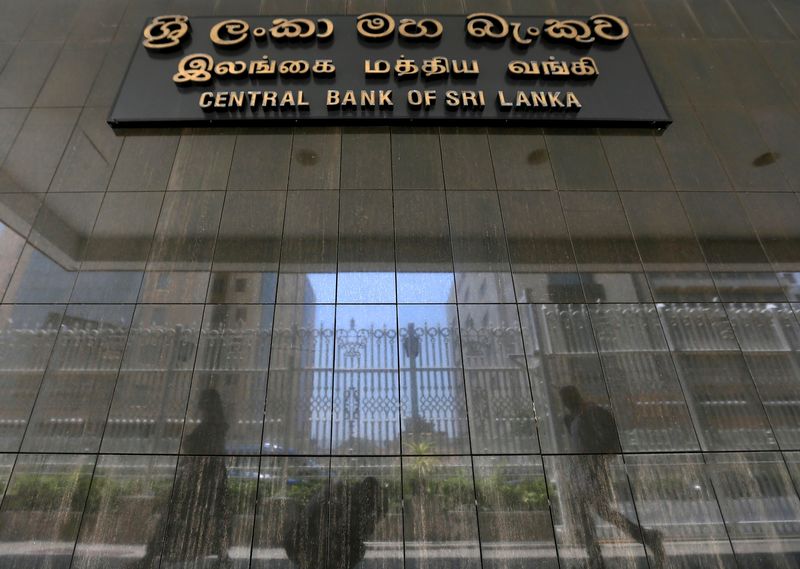
© Reuters. People walk past the main entrance of the Sri Lanka’s Central Bank in Colombo, Sri Lanka March 24, 2017. REUTERS/Dinuka Liyanawatte/File Photo
By Uditha Jayasinghe
COLOMBO (Reuters) -Sri Lanka’s central bank lowered interest rates by 50 basis points in an unexpected move on Tuesday as policymakers prioritised boosting growth and steering the economy out of its worst financial crisis in decades.
The Central Bank of Sri Lanka (CBSL) reduced the Standing Deposit Facility Rate to 8.50% and the Standing Lending Facility Rate to 9.50%, catching markets by surprise as 11 out of 16 economists and analysts polled by Reuters had expected rates to remain unchanged.
The latest move brings the total interest rate cuts to 700 basis points since last year as Sri Lanka began a painful recovery after slipping into its biggest economic crisis since independence from the British in 1948.
“The possible upside risks to inflation in the near term would not materially change the medium-term inflation outlook, as economic activity is projected to remain below par for an extended period,” the central bank said in a statement.
The decision to lower rates would help maintain inflation at the targeted level of 5% over the medium term, while enabling the economy to reach its potential, CBSL added.
The bank had kept its policy rates unchanged in January to tame inflation after a 3% sales tax increase at the start of the year pushed up prices and boosted inflation to 5.9% in February.
The central bank stressed the need for market interest rates to continue to move down, and said demand conditions remain subdued while the recent tax policy change was having a lower-than-expected impact on inflation.
“The decision seems to be very much driven by a desire to support demand conditions and boost growth further, taking advantage of the impact of electricity tariff reduction and appreciation of currency,” said Thilina Panduwawala, head of research at Frontier Research.
The rate reductions bolster the positive sentiment after the International Monetary Fund staff agreement but is unlikely to have an impact on the debt restructuring talks this week, he added.
Sri Lanka is due to start talks with private bondholders to restructure $12 billion of debt, which the country defaulted on in May 2022 after its foreign reserves fell to catastrophic lows leaving it unable to pay for essentials such as fuel, cooking gas and medicine.
The island nation received a confidence boost when it reached a staff level agreement with IMF last week, taking it a step closer to securing the next tranche of a $2.9 billion bailout package from the global lender.
Sri Lanka’s economy shrank 2.3% in 2023 but grew 4.5% in the fourth quarter setting the stage for a recovery this year.
“This growth momentum is expected to continue in the upcoming quarters,” CBSL said.


